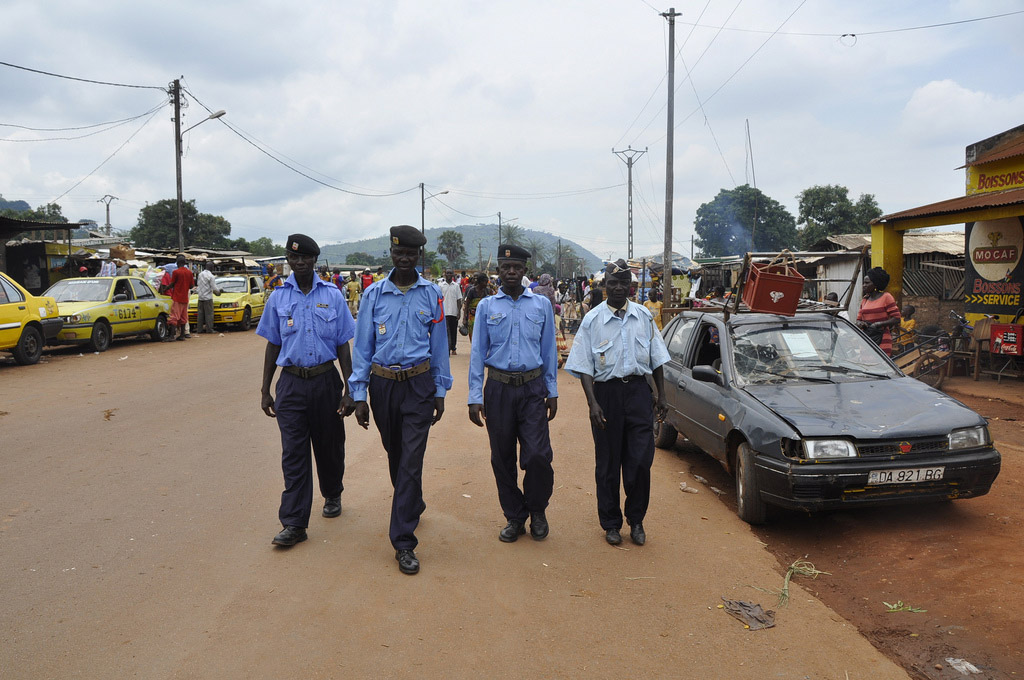April 23, 2024 15:53 (IST)

Chadian soldiers responsible for Bangui attack: UN
New York, Apr 5 (IBNS): A preliminary investigation by the United Nations human rights office into the deadly events that took place on Mar 29 in a suburb of Bangui, the crisis-riven capital of the Central African Republic (CAR), has found that Chadian soldiers killed some 30 civilians and seriously wounded more than 300 in an indiscriminate attack on a crowded market.
Rupert Colville, spokesperson for the Office of the High Commissioner for Human Rights (OHCHR), made the announcement during a press conference on Friday in Geneva, where he said the UN had received more detailed information on the incident following an initial investigation carried out by a human rights team on the ground.
Earlier this week, the team from the Human Rights and Justice Section of the UN Integrated Peacebuilding Office in CAR (BINUCA) visited the Hopital Communautaire and the Hopital General, the two medical centres where most of the survivors were being treated. The team also visited the site where the shooting took place at a neighbourhood known as PK 12, in the north of Bangui.
PK 12, as well two other neighbourhoods, PK 5 and PK 13, was earlier identified by OHCHR as the site of sporadic inter-communal clashes, as reprisal attacks between mostly Muslim ex-Séléka and Christian anti-Balaka militias have escalated steadily over the past three months.
The clashes have marked the increasingly sectarian nature of the crisis, which erupted in December 2012 when Séléka rebels launched attacks against the CAR Government. Thousands of people are believed to have been killed thus far, and some 2.2 million, about half the country’s population are now in need of some form of humanitarian aid.
As for the 29 March incident, Colville said that according to the information collected so far, Chadian national army soldiers in a convoy consisting of several military pick-ups entered Bangui, and went to PK 12. “Several sources told the investigating team that they believed the Chadian force had entered Bangui to extract remaining Chadians and other Muslim inhabitants, in order to save them from further attacks by anti-Balaka,” he said.
As soon as the convoy reached the market area in PK 12, around 3 p.m., it reportedly opened fire on the population without any provocation, continued Colville. At the time, the market was crowded, including with many girls and women buying and selling produce. “As panic-stricken people fled in all directions, the soldiers allegedly continued firing indiscriminately.”
According to information the human rights team has gathered so far, it seems the Chadian force’s action was totally disproportionate as they were shooting in a crowded market full of unarmed civilians. He said the team’s preliminary findings revealed that some 30 people were killed as a result of the shooting and over 300 were seriously injured, including children, people with disabilities, pregnant women and elderly people, “as they were less able to run for their lives.”
Responding to questions about the identity of the soldiers, Colville said they were not Chadian troops participating in the African-led International Support Mission in CAR (MISCA), but regular Chadian army forces.
“It seems they have gone straight back to Chad without being apprehended,” he said, cautioning that it is “a bit early” to ascribe motivation. He said the Commission of Inquiry on the ground in Bangui would obviously look into this incident, as well as others.
Colville said that UN Secretary-General Ban Ki-moon has made very clear that there is a desperate need for a good-sized peacekeeping force, and has requested 10,000 troops. “There is nowhere near that number at the moment, although some European Union troops are due to arrive soon,” he said.
Asked about reports that Chad will withdraw from MISCA, Alessandra Vellucci, Chief, Press and External Relations of the UN Information Service in Geneva (UNIS), said the force was an AU-led force and so any questions on that would need to go to the AU. As such, the Organization would not comment on their departure, but there were preparations for a UN presence, which depended on decisions by the Security Council.
(Gendarmerie on patrol in the neighbourhood of PK 12, Bangui, Central African Republic. Photo BINUCA)
Support Our Journalism
We cannot do without you.. your contribution supports unbiased journalism
IBNS is not driven by any ism- not wokeism, not racism, not skewed secularism, not hyper right-wing or left liberal ideals, nor by any hardline religious beliefs or hyper nationalism. We want to serve you good old objective news, as they are. We do not judge or preach. We let people decide for themselves. We only try to present factual and well-sourced news.
Support objective journalism for a small contribution.
Latest Headlines
Independent review panel releases final report on UNRWA Tue, Apr 23 2024
Thousands of children killed or maimed by explosive weapons in populated areas: UNICEF Tue, Apr 23 2024
Secretary-General Antonio Guterres calls for UN 2.0 to tackle 21st century challenges Tue, Apr 23 2024
Antonio Guterres upholds UNRWA as a ‘lifeline’ following receipt of independent panel’s report Tue, Apr 23 2024
Uber bans Hindu woman in Sydney for 5 months over name controversy; reverts decision, issues apology Tue, Apr 23 2024
Canada Border Services Agency’s internal launch to remodel tax collection of import goods rescheduled Tue, Apr 23 2024
Toronto endorses city-wide expansion of its alcohol in parks program Tue, Apr 23 2024







